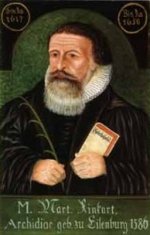"Martin Rinckart [Rinkart] was one of those provincial clergymen to whom Germany had so much reason to be grateful. The son of a poor coppersmith, he made his way at the University of Leipzig by dint of industry and his musical gifts, took orders, and was precentor of the church at Eisleben.
"At the age of thirty-one was offered the place of Archdeacon at his native town of Eilenburg in Saxony. He went there as the war broke out, and died just after the peace, and throughout these thirty-one years he stood by his flock, and helped them to the utmost under every kind of distress. Of course he had to endure the quartering of soldiers in his house, and frequent plunderings of his little stock of grain and household goods. But these were small things.
"The plague of 1637 visited Eilenburg with extraordinary severity; the town was overcrowded with fugitives from the country districts where the Swedes had been spreading devastation, and in this one year 8,000 persons died in it. The whole of the town council except three persons, a terrible number of school children, and the clergymen of the neighbouring parish, were all carried off; and Rinckart had to do the work of three men, and did it manfully at the beds of the sick and dying. He buried more than 4,000 persons, but through all his labours he himself remained perfectly well. The pestilence was followed by a famine so extreme that thirty or forty persons might be seen fighting in the streets for a dead cat or crow. Rinckart, with the burgomaster and one other citizen, did what could be done to organize assistance, and gave away everything but the barest rations for his own family, so that his door was surrounded by a crowd of poor starving wretches, who found it their only refuge.
"After all this suffering came the Swedes once more, and imposed upon the unhappy town a tribute of 30,000 dollars. Rinckart ventured to the camp to entreat the general for mercy, and when it was refused, turned to the citizens who followed him, saying, "Come, my children, we can find no hearing, no mercy with men, let us take refuge with God." He fell on his knees, and prayed with such touching earnestness that the Swedish general relented, and lowered his demand at last to 2,000 florins. So great were Rinckart's own losses and charities that he had the utmost difficulty in finding bread and clothes for his children, and was forced to mortgage his future income for several years."
In the midst of the war and suffering, Rinckart is best known for writing the great hymn that triumphantly proclaims this:
Now thank we all our God, with heart and hands and voices
Who wondrous things has done, in whom this world rejoices;
Who from our mothers' arms has blessed us on our way
With countless gifts of love, and still is ours today.
Who wondrous things has done, in whom this world rejoices;
Who from our mothers' arms has blessed us on our way
With countless gifts of love, and still is ours today.
O may this bounteous God, Through all our life be near us
With ever joyful hearts, And blessed peace to cheer us
And keep us in His grace and guide us when perplexed
And free us from all ills, in this world and the next.
All praise and thanks to God The Father now be given.
The Son, and Him who reigns with them in Highest Heaven
The one eternal God, Whom earth and heav'n adore
For thus it was is now, and shall be evermore.
How are you thanking God with your heart? Your hands? Your voice?
What countless gifts of love have you received?
How do you sense He's near you when perplexed?
How have you experienced being "kept" in His grace?
How have you experienced being "kept" in His grace?
May you have a very unhurried and rich Thanksgiving with eyes to see the wondrous things God has and is doing in and around your life!






No comments:
Post a Comment